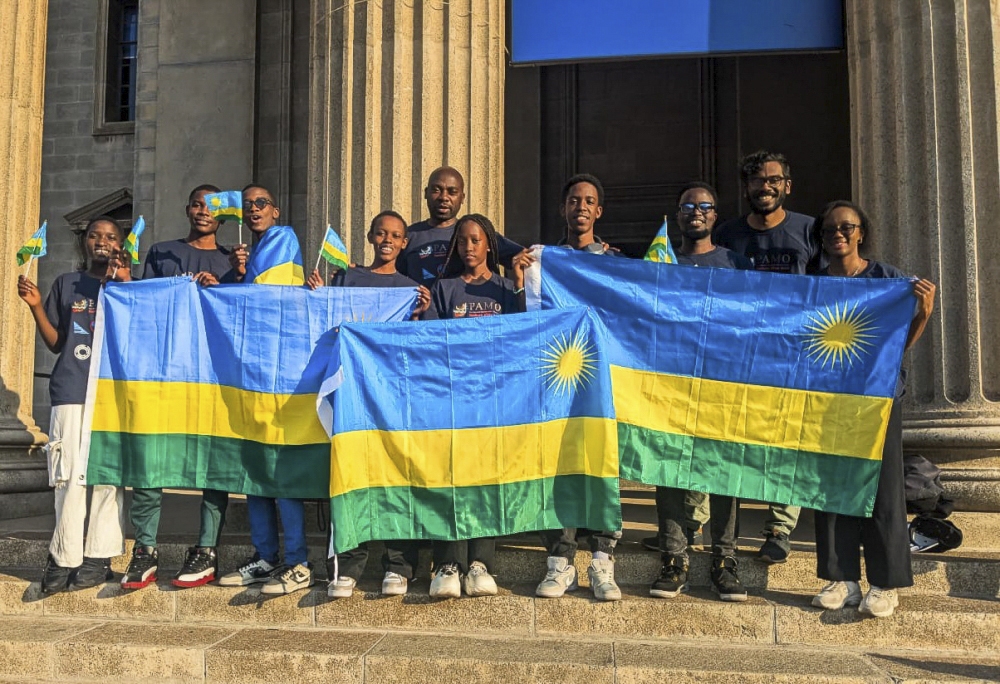

Rwanda is steadily harnessing its mathematics talent, a success highlighted by the recent gold medal win at the Pan-African Mathematics Olympiad (PAMO), in Johannesburg, South Africa, on August 20.
This achievement underscores the effectiveness of a robust program dedicated to nurturing young talent and cultivating future leaders in the field.
According to Rwanda Mathematics Olympiads, the journey to becoming a part of Rwanda's elite mathematics team begins with the Rwanda Math Competition and the Junior Rwanda Math Competition, which collectively attract about 40,000 participants each year.
ALSO READ: Rwandan students win gold medal at African math competition
Through a series of progressively challenging rounds, the top students are identified and invited to participate in national training camps. From these camps, the best are selected to represent Rwanda in international competitions.
According to Arun Shanmuganathan, Co-founder of Rwanda Maths Olympiads, the backbone of Rwanda&039;s success in mathematics lies in its structure training program.
"Spearheaded by a group of coaches of which many of whom are alumni of the same program. These coaches specialize in various mathematical disciplines such as algebra, number theory, geometry, and combinatorics. They provide rigorous, problem-led training that focuses on developing students' problem-solving abilities rather than overwhelming them with content,” he explained.
"The training is intensive, with four camps held annually (August, December, April, and July) designed to prepare students for high-level international competitions like the International Mathematics Olympiad (IMO) and PAMO. These camps serve as incubators for talent, where students are challenged with complex problems, receive personalised feedback, and develop the skills necessary to tackle the most difficult mathematical challenges.”
ALSO READ: Meet Tuyisenge, 15-year-old Rwandan gold medalist in math
In an effort to make the program as inclusive as possible, the organisers are working with over 800 schools across the country. Schools that demonstrate a strong commitment to mathematics, such as those with active math clubs, receive additional support in the form of materials, content, and teacher collaboration.
This widespread engagement ensures that talented students from every district in Rwanda have a chance to be recognised and developed.
The program's focus is shifting towards the International Mathematics Olympiad, a competition that attracts the best young mathematicians from around the world.
According to the program coordinators, Rwanda's "A team" is being groomed to compete at this level, with the ultimate goal of winning medals at the IMO.
Celestin Kurujyibwami, head of the Mathematics Department at the University of Rwanda, has outlined a strategic plan to overcome key challenges in Rwanda’s mathematics education and competition.
By partnering closely with the Ministry of Education, the department hopes to address issues related to funding, training, and student preparation.
One of the significant challenges highlighted is the financial strain involved in supporting students throughout various competition stages.
"We face difficulties in covering transport costs, providing necessary facilitation for students, and offering prizes at all levels of the competition, including plane tickets for international events," he said.
"To better prepare students for international competitions, we want to initiate training centers where students can attend during holidays, ideally one in every district. This will allow us to continuously update their skills and techniques. These training camps would provide a solid foundation for students to excel in both national and international mathematics competitions.”
Kurujyibwami also emphasised the importance of training mathematics teachers as they are crucial in shaping the students' abilities.
"They need to be equipped with the skills necessary to improve students' critical thinking and problem-solving capacities, the proposed training programs for teachers would ensure that they are well-prepared to guide students effectively,” he explained.
Kurujyibwami also highlighted the benefits of these mathematics competitions extending beyond just the individual participants.
"These competitions enhance students' critical thinking skills, which they can share with their peers upon return. Additionally, they offer scholarships to prestigious universities, bringing international recognition to our country. The early preparation for these competitions is essential for maximizing student performance and attracting more participants.”
ALSO READ: Don’t stop at medals, Kagame tells Rwandan math talent
By starting mathematics competitions earlier in the academic year and providing comprehensive training and support, the University of Rwanda aims to elevate the country’s standing in mathematics on the global stage. This initiative is not just about winning competitions but fostering a culture of excellence that will contribute to the overall development of Rwanda.
Gaspard Twagirayezu, the Minister of Education, emphasised the strategic direction for enhancing Rwanda's mathematical educational system.
"Our focus moving forward is to strengthen the educational framework by ensuring that the right curriculum is in place and by creating more opportunities for students to showcase their abilities. This recognition will undoubtedly inspire more students to excel in their studies and realize that they too can achieve even greater heights.”
Twagirayezu expressed optimism about the future of mathematics competitions.
"We hope that these competitions continue to thrive and more Rwandan students participate, bringing home even more medals. When our students compete, it demonstrates their capability. Even if they do not win a medal, their participation alone is a testament to their potential.
Many of the students who have taken part in these competitions are now studying at prestigious universities worldwide, including in Turkey and the United States. These opportunities open doors to scholarships and academic prospects, not just at local institutions but also on an international scale, we want this for our future generation."


